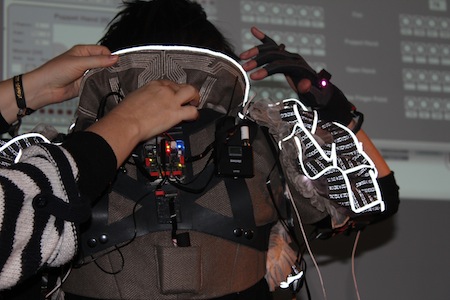how to sew the vmeter sleeve
Monday, April 1st, 2013Tim’s midi-osc article has now an explanation on How to sew the vmeter sleeve and a video which shows the wireless vmeter in action:
randformblog on math, physics, art, and design |
Tim’s midi-osc article has now an explanation on How to sew the vmeter sleeve and a video which shows the wireless vmeter in action:
A sort of brief follow-up to the last two posts about simulations. Here a link to Tim’s simulation of a critter under the couch.

artwork: “Berlin citysimbim” by glocki
This post is a kind of follow-up post to the last one, which dealt amongst others with simulations of political/economic scenarios in multiplayer online games. In a couple of days a new SimCity game will come out and as Wikipedia puts it:
This version of SimCity will be the first to feature full online play since Maxis’s SimCity 2000 Network Edition,[1] allowing for regions to house multiple cities from different players. Regions can alternatively be set to private for solo play.[31] SimCity will require players to be logged into EA’s Origin service to play the game, including when playing single player.
or as SimCity.com puts it:
SimCity has truly connected cities within larger regions for the first time. Cities do not exist in a bubble – they are living, breathing systems that make up a region – and now you can trade and share resources among cities and regions in real time.
Unfortunately the above mentioned Origin seems to have sofar stirred up a lot of controversy about privacy issues. In Europe there are currently new data protection regulations underway, which by the way seem to be heavily “informed” by lobbyists. (The website Lobbyplag (unfortunately sofar only in german) gives an overview, which law drafts have been directly pasted in from which lobbyists brochures.) In view of this ungoing process it is thus however sofar not clear wether any of the discussed privacy issues of Origin will have any or what juridicial consequences.
SimCity2013 seems to allow for no modding at least right after launch. That is in an interview with gameinformer SimCity lead producer Kip Katsarelis replied to the question:
Is there an element of user-created content and sharing in city customization?
We’re not committing to any of that at this time, but we know that is part of Maxis. In SimCity 4, a lot of those tools were released pretty much a year after launch. So, definitely on our minds, but I can’t promise that we’re delivering on any of that right now.
If modding would have been possible then -apart from eventual privacy/data protection problems- the people from the project of the last post could have eventually thought about wether it would make sense to use SimCity2013Mods for their purpose. However it should also pointed out, that even if modding would be possible then too political game mods could pose problems.
One should also think about the economic consequences of computer simulations/games etc. (you may eventually also want to read my comment on the blog Backreaction in this context.)
addition 13.12.17: For the readers convenience, here a copy of the comment on the blog Backreaction:
nad0815 said…
What you seem to be somewhat discussing is to some extend wether there exist some god(s).
That is if I replace “simulation” with “creation by god” and if I replace “computer” with “human mind accessible universe” then your discussion looks very similar to that discussion.
Finally wether something feels “simulated” or “real” is quite a question of perception. You may eventually want to read:
And since there are quite some humans who claim that they already saw/perceived/DISCOVERED the “simulator(s)” your “coincidence problem” seems to be spread over all centuries.
you wrote:
“To begin with, unless you want to populate the simulation by hand, you need a process in which self-awareness is created out of simpler bits. And to prevent self-aware beings from noting the simulation’s limits, you then need a monitoring program that identifies when the self-aware parts attempt to make an observation and exactly which observation.”
Why should self-awareness (of limitations) be necessary to simulate self-aware entities? In fact a simulation of (aware) entities could happen by un-self-awarely mimicking a construction process and/or by chance. In that case your simulation would neither be a “creation of an aware god” nor be it “fully self-organized by some abstract laws and/or random outer conditions”. And thus there seems to be in particular no reason why simulated entities need to be kept from noticing that they are simulated like in order “to save on computational power” – that is they could awarely simulate without knowing that they are simulated themselves or they could even simulate whatever while being completely unaware of whatever. Both would need calculational power.
In fact I do think that nowadays “simulations” in computer games (and related computer environments) use up a lot of power, labour, time etc. and that this seems to have already quite an economic impact:
http://www.azimuthproject.org/azimuth/show/Economic+growth+and+limitationsSo you’d never observe any effects of finite lattice spacing because whenever you look all symmetries are restored. Wicked. It also creates other scientific problems.
(short side remark: There exist of course also fractals)
Considering the alien question: The reason that we have sofar not detected any “aliens” could of course be also for the reason that mankind has sofar been regarded as a kind of “baby civilization” and has thus sofar been protected from any shocks which could result from meeting the aliens…
5:24 AM, March 03, 2013

Musician Imogen Heap in her tech wear
In a recent comment on randform randform reader Bibi asked:
You had written at Azimuth that your idea to use MMOGs for simulating economic and political real world scenarios
seems to have recently been picked up for the Global Participatory Platform of the 2013 Flagship proposal FucturICT
It seems also that your scientific platform idea had been picked up for that ICTfutur grant proposal.
What about your intellectual property?
The FuturICT application for 1 billion Euros had though been turned down, will you now write an EU grant proposal?
Answers to this comment after the click.
The last blog post received quite some comments which I would like to answer. So reader Jared Khithim asked about the use of my proposals for a pre-preprint achive:
..this seems to be a quite clear violation of your copyrights! Are you going to sue Holtzbrinck?
Reader M. Boulangel saw this similarily and wondered wether I wouldn’t like to set up my own preprint archive and last but not least reader Mandy asked about the CC-10 birthday party:
…is boring talks the new berlin party scoop?
So regarding the copyright issue: No – I don’t want to sue Holtzbrinck. In fact it’s not only that I find my suggestions not overly original and rather intuitive but also that I think that it’s good that at least some people care about the issue. Moreover I don’t want to set up a preprint archive – I actually had already set up** and maintained a preprint archive for almost ten years at the former sfb288 which starts with lecture notes* by Ludvig Faddeev from autumn 1991.
I could also imagine that eventually some kind of pre-preprint archive may exist already at some institution, as there are meanwhile many institutional repositories. Or there may be related projects. Like for the Mimirix project we used trac for (amongst others) reading the students works and who knows wether there aren’t universities who already set up their own online dissertation pre-print archive. I still think it would be good to have something like this with a long term support offered by a global public institution like the arxiv.org. A company like Holtzbrinck has to keep its own business interest in focus and this may unfortunately turn out to be eventually at some point against the original idea of science.
Concluding – I eventually would use my “copyrights” passively, that is in case someone would e.g. try to forbid the arxiv.org to set up such a thing, because of copyright issues (there are still software patents in the US) then I could eventually try to help the arxiv with my timestamped proposals, which are distributed over the internet. But I don’t think that this is going to happen.
*the preprints have no licence, since back then a kind of creative commons share-a-like licence was sort of self-understood for preprints, I actually don’t know how the arxiv handles these new laws.
**with technical help from colleagues
Regarding the party… the party of course started after the talks, images after the click.
(more…)
As of today 12.12.12. the art blog vvork who used to be in randforms blog roll announced to stop vvork vvorking.
Tim likes to learn more about 3D modelling – last but not least – for the purpose of enhancing his mathematical galley. steampunkmoth has been Tim’s newest Blender-baby.
After the click some infographics which illustrate the german Reformvorschläge (in german).
(more…)
LIMITED TIME OFFER !!!! LIMITED TIME OFFER!!!!! LIMITED TIME OFFER!!!!